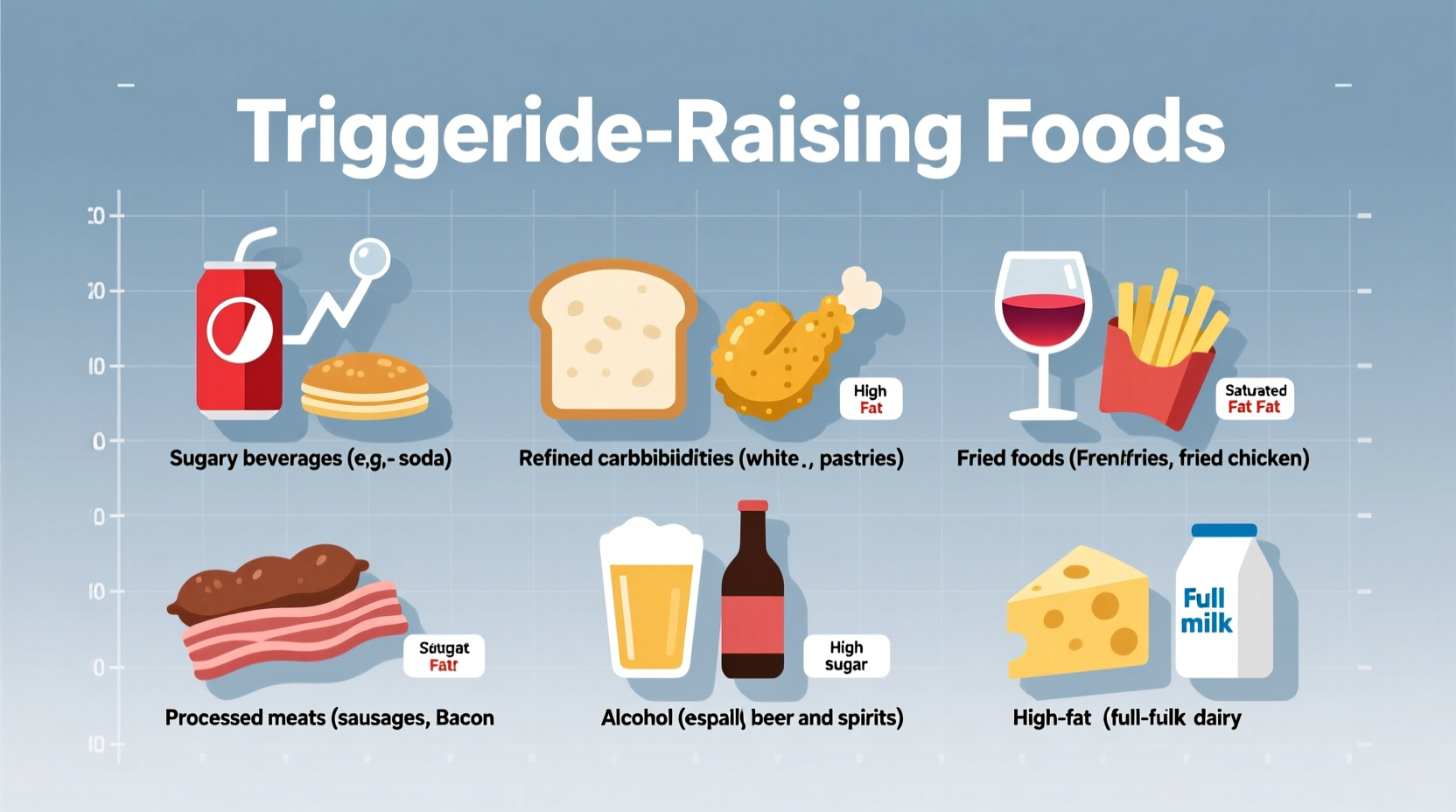Excess sugar, refined carbohydrates, alcohol, and unhealthy fats are the primary foods that increase triglycerides. Specifically, sugary beverages, white bread, pastries, fried foods, and alcoholic drinks can rapidly elevate your triglyceride levels, increasing cardiovascular risk. Cutting these foods while increasing omega-3 rich options like fatty fish can significantly improve your lipid profile within weeks.
Understanding which foods increase triglycerides is crucial for heart health management. Triglycerides are blood fats that, when elevated, significantly increase your risk of heart disease and stroke. The American Heart Association identifies high triglyceride levels (above 150 mg/dL) as a major cardiovascular risk factor affecting nearly 25% of American adults.
Why Triglyceride Levels Matter for Your Health
When you consume more calories than your body needs immediately, those excess calories convert to triglycerides and store in fat cells. While some triglycerides are necessary for energy, consistently high levels create inflammation in your arteries and contribute to atherosclerosis. Research from the Centers for Disease Control and Prevention shows that people with high triglycerides are twice as likely to develop heart disease compared to those with normal levels.

The Top 5 Food Categories That Increase Triglycerides
1. Sugary Beverages and Sweetened Drinks
Soda, fruit juices, energy drinks, and sweetened coffee beverages represent the single largest source of added sugars in the American diet. A single 12-ounce soda contains approximately 39 grams of sugar - nearly the entire daily recommended limit. According to a study published in Circulation, consuming just one sugar-sweetened beverage daily increases triglyceride levels by 15-20% within 6 weeks.
2. Refined Carbohydrates
White bread, pasta, pastries, and other refined carbs behave similarly to sugar in your body. These foods lack fiber and nutrients, causing rapid blood sugar spikes that trigger fat production. The National Institutes of Health reports that diets high in refined carbohydrates increase triglycerides by promoting hepatic de novo lipogenesis - the process where your liver converts excess carbs to fat.
3. Alcohol Consumption
Alcohol significantly impacts triglyceride metabolism, particularly when consumed in excess. Even moderate drinking (more than one drink daily for women, two for men) can raise triglycerides by 30-50%. The liver prioritizes alcohol metabolism over fat processing, causing triglycerides to accumulate in the bloodstream. This effect is especially pronounced with sugary mixed drinks and beer.
4. Fried and Processed Foods
Foods cooked in unhealthy oils, particularly those containing trans fats, dramatically increase triglyceride production. Fast food, packaged snacks, and commercially fried items often contain partially hydrogenated oils that both raise triglycerides and lower protective HDL cholesterol. The Mayo Clinic confirms that trans fats increase triglycerides more than any other dietary component.
5. High-Fructose Corn Syrup Products
Beyond obvious sugary treats, high-fructose corn syrup hides in countless processed foods - from ketchup to bread to salad dressings. Unlike glucose, fructose metabolizes almost exclusively in the liver, where it directly converts to triglycerides. Research in the American Journal of Clinical Nutrition shows that fructose consumption increases triglyceride production three times more than glucose.
| Food Category | Triglyceride Impact | Time to Noticeable Effect | Recommended Limit |
|---|---|---|---|
| Sugary beverages | High (20-30% increase) | Within hours | 0 servings daily |
| Refined carbohydrates | Moderate-High (15-25% increase) | 1-3 days | 1 serving daily max |
| Alcohol | High (30-50% increase) | Within 24 hours | Moderate: 1-2 drinks daily |
| Fried foods | Moderate (10-20% increase) | 1-2 days | 1-2 times weekly max |
| Processed snacks | Moderate (15-25% increase) | 2-3 days | Occasional only |
How Quickly Do These Foods Affect Triglyceride Levels?
The timeline for triglyceride elevation varies by food type and individual metabolism. Sugary beverages can raise triglycerides within hours of consumption, while the effects of regular refined carbohydrate intake may take several days to manifest. According to the American College of Cardiology, consistently consuming high-triglyceride foods can elevate levels by 20-50% within 4-6 weeks. The good news? Eliminating these foods can produce measurable improvements in as little as two weeks.
Individual Factors That Influence Triglyceride Response
Not everyone responds to triglyceride-raising foods equally. Several factors affect your individual response:
- Genetic predisposition: Some people have genetic variations affecting fat metabolism
- Current weight: Excess body fat, particularly abdominal fat, worsens triglyceride response
- Physical activity level: Regular exercise improves triglyceride clearance
- Existing health conditions: Diabetes and metabolic syndrome amplify negative effects
- Medications: Certain drugs like beta-blockers can affect triglyceride metabolism
Practical Steps to Lower Your Triglycerides Through Diet
Replacing triglyceride-raising foods with healthier alternatives produces significant improvements. The Mediterranean diet, rich in vegetables, whole grains, lean proteins, and healthy fats, has been shown to reduce triglycerides by 15-25% in clinical trials. Start with these evidence-based changes:
- Swap sugary drinks for water, herbal tea, or sparkling water with lemon
- Replace refined grains with whole grains like oats, quinoa, and brown rice
- Choose baked, grilled, or steamed foods instead of fried options
- Limit alcohol to moderate levels or eliminate completely for fastest results
- Incorporate omega-3 rich foods like salmon, walnuts, and chia seeds daily
- Read labels carefully to avoid hidden sugars and unhealthy fats
Remember that consistency matters more than perfection. The American Heart Association recommends focusing on overall dietary patterns rather than individual foods. Small, sustainable changes create lasting improvements in triglyceride levels and overall heart health.











 浙公网安备
33010002000092号
浙公网安备
33010002000092号 浙B2-20120091-4
浙B2-20120091-4